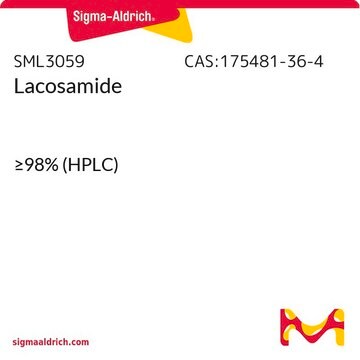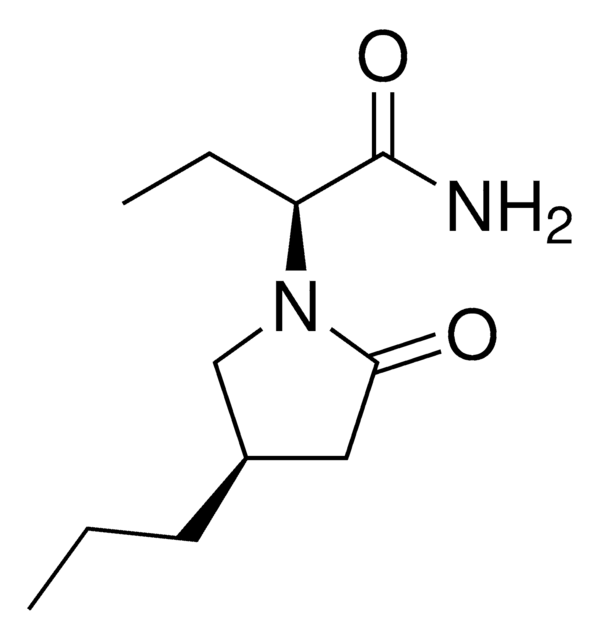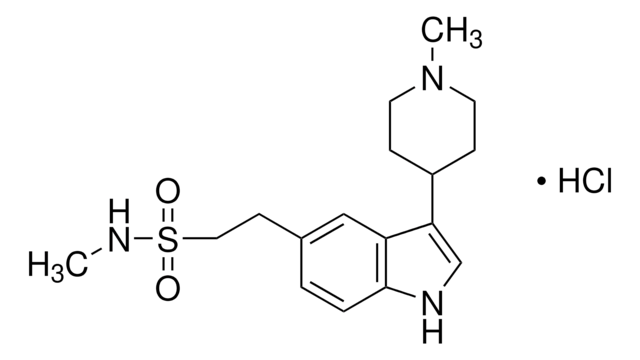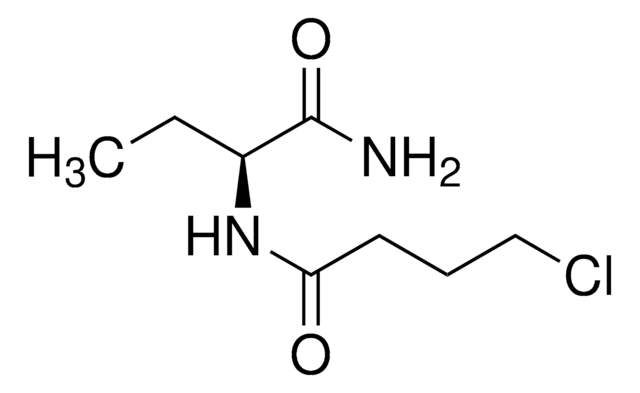推荐产品
product name
左乙拉西坦, ≥98% (HPLC)
化驗
≥98% (HPLC)
形狀
powder
顏色
white
溶解度
H2O: >5 mg/mL
起源
UCB Inc.
SMILES 字串
CC[C@H](N1CCCC1=O)C(N)=O
InChI
1S/C8H14N2O2/c1-2-6(8(9)12)10-5-3-4-7(10)11/h6H,2-5H2,1H3,(H2,9,12)/t6-/m0/s1
InChI 密鑰
HPHUVLMMVZITSG-LURJTMIESA-N
基因資訊
human ... CACNA1B(774) , SV2A(9900)
正在寻找类似产品? 访问 产品对比指南
一般說明
Levetiracetam is a member of the pyrrolidone family, which is a second-generation anti-epileptic drug (AED). It acts as a neuroprotective and hyperalgesic drug. Levetiracetam is implicated in cholinergic neurotransmission.
應用
Levetiracetam has been used as an anti-epileptic drug to study its effects on glucose-mediated death.
生化/生理作用
左乙拉西坦是一种具有抗癫痫活性的吡咯烷。左乙拉西坦的立体选择性结合仅限于中枢神经系统的突触质膜,而在周围组织中不发生立体选择性结合。左乙拉西坦在不影响正常神经元兴奋性的情况下抑制簇状放电,这表明它可以选择性地阻止癫痫样簇状放电的超同步和发作活动的传播。
特點和優勢
This compound was developed by UCB Inc.. To browse the list of other pharma-developed compounds and Approved Drugs/Drug Candidates, click here.
儲存類別代碼
11 - Combustible Solids
水污染物質分類(WGK)
WGK 3
閃點(°F)
Not applicable
閃點(°C)
Not applicable
個人防護裝備
dust mask type N95 (US), Eyeshields, Gloves
其他客户在看
Levetiracetam as an antiepileptic, neuroprotective, and hyperalgesic drug
Cortes-Altamirano JL, et al.
Neurology India, 64(6), 1266-1266 (2016)
Shaikhah Alshuaib et al.
Synapse (New York, N.Y.), 74(8), e22154-e22154 (2020-03-20)
Levetiracetam (LEV) is a widely prescribed antiepileptic drug, but its actions on neuronal function are not fully characterized. Since this drug is believed to enter neurons by binding to a vesicular protein during endocytosis, we used motor axons of the
Opposing effects of fasting metabolism on tissue tolerance in bacterial and viral inflammation
Wang A, et al.
Cell, 166(6), 1512-1525 (2016)
Hai-Dun Yan et al.
Brain research bulletin, 90, 142-148 (2012-10-31)
Levetiracetam (LEV) is a widely used antiepileptic agent for partial refractory epilepsy in humans. LEV has unique antiepileptic effects in that it does not inhibit electroshock- or pentylenetetrazol-induced convulsion, but does inhibit seizures in kindling animal and spontaneously epileptic rat
Marjolein de Groot et al.
Neuro-oncology, 15(2), 216-223 (2012-12-13)
Treatment of high-grade glioma (HGG) patients with anti-epileptic drugs (AEDs) has met with various side effects, such as cognitive deterioration. The cognitive effects of both older and newer AEDs in HGG patients are largely unknown. The aim of this study
我们的科学家团队拥有各种研究领域经验,包括生命科学、材料科学、化学合成、色谱、分析及许多其他领域.
联系技术服务部门













